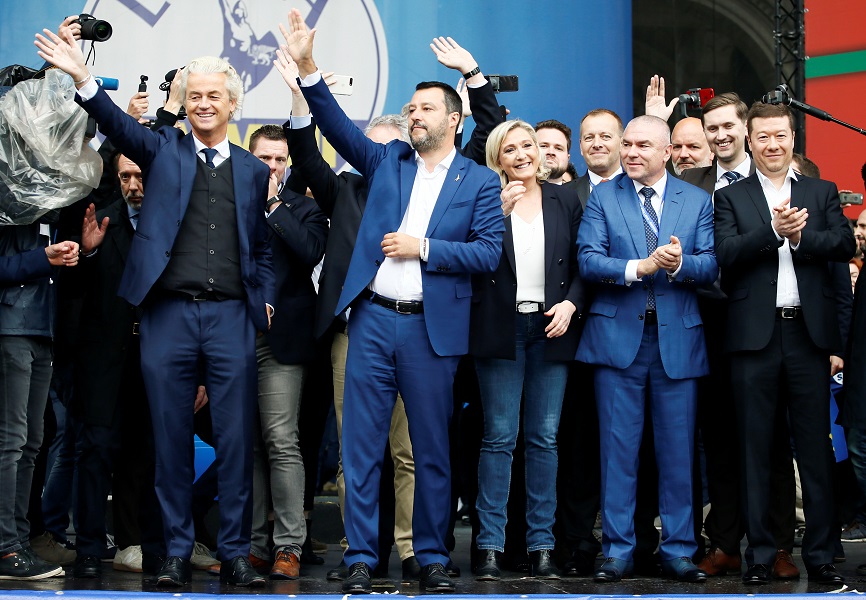Elections for European Parliament have traditionally received little notice inside or outside the EU. But this week's vote for the 751 members of the legislative body that is divided between Brussels and Strasbourg is shaping up to be one of the most consequential in the bloc's history. As voters across the EU's 28 member states prepare to go to the polls from 23 May to 26 May, Eurasia Group expert
Federico Santi explains what to watch for.
Mainstream party losses
The informal alliance of center-right and center-left parties that has dominated European Parliament for 40 years is projected to lose its majority, as voters in many member states have grown increasingly disenchanted with their ineffective response to challenges such as migration, globalization, and economic stagnation. The center-right European People's Party (EPP) and center-left Socialists and Democrats (S&D) are projected to obtain together about 42% of the vote, down from 53% in 2014. As a result, they will have to rely on other pro-European parties such as the liberal Alliance of Liberals and Democrats for Europe, the Greens, and French President Emmanuel Macron's La Republique En Marche to advance their political and policy priorities. This will complicate the selection of candidates for top EU positions and could also impair decision-making in important areas such as trade and investment agreements; the EU's multi-annual financial framework; efforts to stem the erosion of the rule of law in some member states; and economic and fiscal integration, most notably for the Eurozone.
Populist gains
Within a more fragmented parliament,
populist parties will gain more power. With their nationalist and anti-EU rhetoric, these formations are expected to gain roughly 25% of the vote, up from 20%. Last month, Italy's Deputy Prime Minister
Matteo Salvini announced a right-wing alliance among nationalist parties in the next European Parliament, which will comprise Salvini's League, the Alternative for Germany, the Finns Party, the Danish People's Party, the French National Rally, and the far-right Freedom Party of Austria. However, many other euroskeptic parties, such as Italy's Five Star Movement, will be reluctant to join this new group, too closely associated with a nationalist and far-right agenda. Furthermore, the group itself is itself unlikely to be cohesive in practice, as right-wing parties often have diverging positions on key topics ranging from economic and monetary policy, to relations with Russia, to migration. Nonetheless, as highlighted in Eurasia Group's
Top Risks for 2019 report, the populist parties will be in a position to challenge the pro-EU establishment and hinder progress on key legislative initiatives. In the unlikely but possible scenario that the new right-wing alliance becomes the parliament's second-largest force by overtaking the S&D, it might also claim top EU decision-making posts.
Brexit: a complicating factor
Nearly two months after the UK was originally scheduled to leave the EU, voters in that country are expected to punish Prime Minister Theresa May's Conservative Party for failing to deliver
Brexit. That will have domestic implications—further weakening May's grip on power—but will also affect the array of forces in the European Parliament. The decline of the UK's Conservative Party and the corresponding gains for Labour will undermine somewhat the EPP, expected to win the most seats in the new parliament, while strengthening the S&D, which is expected to win the second largest number. By shrinking the gap between the EPP and S&D, senior officials in Brussels fear the UK could also be handing the populist
Hungarian Prime Minister Viktor Orban the power to determine the balance between the two groups—should he choose to leave EPP. At the same time, the realization that the added strength for the S&P comes from the departing UK will make it more difficult for the center-left group to leverage that strength. These dynamics will introduce more complexity to the already difficult task of forming coalitions and agreeing on top jobs.
Impact for national politics
European election results are expected to reverberate at the member-state level. In Germany, for example, both the Christian Democratic Union/Christian Social Union (CDU/CSU) and the Social Democratic Party (SPD) are expected to suffer big losses in the upcoming vote. A double-digit loss for the SPD would lead to more frustration among party members and put pressure on it to leave
the coalition government with the CDU/CSU, which it reluctantly joined in 2017, and likely force new elections in Germany. In France, Macron has declared the European Parliament elections to be a showdown between the “renaissance” of the European project and a resurgent, populist nationalism. Macron's list of candidates is likely—but not certain—to win a narrow victory on 26 May. If it does, even with a slender lead and 23%–24% of the vote, Macron will declare his presidency to have been relaunched and his plan of pro-business and pro-EU reforms to be vindicated. If, however, Marine Le Pen's National Rally wins, Macron's credibility will have been undermined and the final three years of his presidency damaged.
Possible reversal for populists in one corner of Europe
This week's vote will also be a key test for Poland's Law and Justice (PiS) Party ahead of parliamentary elections in that country. PiS is feeling vulnerable, as the alliance of opposition parties under the European Coalition led by Civic Platform (PO) is polling very close to, and at times ahead of, the populist ruling party. In an effort to boost its popularity, the government recently announced a series of populist economic measures, the Kaczynski Five, but its finances are strained, and teachers, farmers, and public-sector workers are striking and pressing for more handouts. So while the ruling party is expected to win the largest number of Poland's seats in European Parliament, its lead will be slim, which could energize the opposition even more and likely pave the way for PiS losing its majority in the parliament in November's elections. That said, PiS would likely retain its hold on government by building a coalition with a smaller right-wing party.

 Geert Wilders of the Dutch PVV party, Italian Deputy Prime Minister Matteo Salvini, Marine Le Pen of the French National Rally party, Veselin Mareshki of the Bulgarian Volya party, and Tomio Okamura of the Czech SPD party attend a rally of European nationalist and far-right parties. REUTERS.
Geert Wilders of the Dutch PVV party, Italian Deputy Prime Minister Matteo Salvini, Marine Le Pen of the French National Rally party, Veselin Mareshki of the Bulgarian Volya party, and Tomio Okamura of the Czech SPD party attend a rally of European nationalist and far-right parties. REUTERS.
